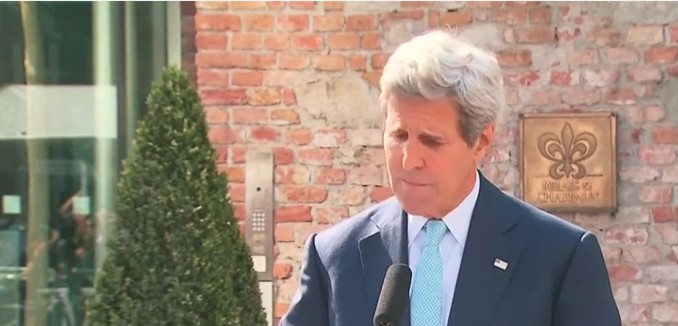Secretary of State John Kerry told reporters in Vienna that ongoing negotiations between the P5+1 global powers and Iran had made progress but that more work was needed before a final agreement could be reached,
If we don’t get a deal, if we don’t have a deal, if there’s absolute intransigence, if there’s an unwillingness to move on the things that are important, President Obama has always said we’ll be prepared to walk away. It’s not what anybody wants. We want to get an agreement.
But I’ve said from the moment I became involved in this we want a good agreement, only a good agreement, and we’re not going to shave anywhere at the margins in order just to get an agreement. This is something that the world will analyze, experts everywhere will look at. There are plenty of people in the nonproliferation community, nuclear experts, who will look at this. And none of us are going to be content to do something that can’t pass scrutiny. Most importantly, President Obama has made it clear we have to close off the four pathways to the potential of a bomb. Our Iranian counterparts have been working hard. They’ve put in a lot of time. Everybody is negotiating hard. That’s what makes this difficult.
But our hope is that we get an agreement that is fair, that gets the job done, and we can hold our heads high and show the world that countries can come together and make things happen. But we’re not there yet. I emphasize that. We have difficult issues still to resolve.
Politico added:
Kerry’s statements followed the release Friday of a YouTube video by Zarif, who said that although the two sides were closer than ever to a deal, alluded to the U.S. and its partners in saying they must choose between “agreement or coercion.”
The public comments, which were the first made by the Secretary of State in several days, came after a meeting between Kerry and Iranian Foreign Minister Mohammad Javad Zarif.
The talks, which had been set to conclude by the beginning of July, were extended by the parties until July 7.
The extension was announced in the wake of Zarif flying back and forth between Vienna and Tehran to consult with Iranian leaders over the terms of the agreement. Just days before the talks had been set to recommence, Supreme Leader Ayatollah Ali Khamenei had reiterated a number of red lines and publicly demanded more Western concessions. Among other things, he prohibited opening up Iran’s military sites for inspections, rejected long-term constraints on centrifuge research and development, and insisted on immediate sanctions relief. The comments were broadly seen as the Iranians reneging upon previously agreed-to positions, codified in the parameters (.pdf) announced on April 2.
When asked about the trip and whether he had received approval, Zarif responded to a reporter, “I already had a mandate to negotiate and I am here to get a final deal and I think we can.” Hours before the extension of the deadline, according to the Associated Press (AP), U.S. officials admitted that “significant backtracking by Tehran’s negotiators…may need several more days to resolve.”
Some issues that had been outstanding at the beginning of the talks appear to have been resolved. The AP reported yesterday that technical experts had come to a consensus on sanctions relief.
One particular Western concession on sanctions relief came a few weeks after the talks in Lausanne, Switzerland. The Wall Street Journal had noted even earlier that Iran would receive a monetary “signing bonus” once a final agreement was reached, prior to Iran meeting any of its obligations, and President Barack Obama subsequently described a potential Iranian windfall that would reach $150 billion. Two weeks earlier, immediately after the Lausanne understandings were announced, the president maintained that sanctions relief would only come “in return for Iran’s actions.”
The AP had already revealed weeks ago that a deal would see sanctions against Iran broadly dismantled and that the administration is seeking to redefine some non-nuclear sanctions so that they can be waived as well.
The scope of the windfall has generated broad unease among America’s traditional Middle East allies and in the halls of Congress. The Iranians are widely expected to use the funds to boost their regional military activities – Tehran is currently engaged in at least four hot wars spread across the region – and their global terror efforts. Jonathan Schanzer, Vice President for Research at the Foundation for Defense of Democracies, told Congress this past April, “[The] Houthis, the Assad regime, Hezbollah, Palestinian Islamic Jihad, Hamas. Every one of these groups stands to benefit. They’re all salivating right now at this idea of a cash infusion.”
[Photo: Reuters / YouTube ]




